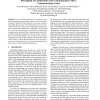Free Online Productivity Tools
i2Speak
i2Symbol
i2OCR
iTex2Img
iWeb2Print
iWeb2Shot
i2Type
iPdf2Split
iPdf2Merge
i2Bopomofo
i2Arabic
i2Style
i2Image
i2PDF
iLatex2Rtf
Sci2ools
132
click to vote
DSD
2007
IEEE
2007
IEEE
Decoupling of Computation and Communication with a Communication Assist
Abstract. In an embedded multiprocessor system the minimum throughput and maximum latency of real-time applications are usually derived given the worst-case execution time of the software tasks. Derivation of the worst-case execution time becomes easier if it is independent of the available communication bandwidth. In this paper we show that the worst-case execution time of tasks does not depend on communication bandwidth if a Communication Assist (CA) is applied, despite that memory ports are shared. Furthermore we show that adding a CA increases the processor utilization and reduces the required communication bandwidth. Finally we show that the difference between the measured and computed worst-case processor utilization is less than 6%, for our MP3 playback application.
Related Content
| Added | 02 Jun 2010 |
| Updated | 02 Jun 2010 |
| Type | Conference |
| Year | 2007 |
| Where | DSD |
| Authors | Arno Moonen, Marco Bekooij, Rene van den Berg, Jef L. van Meerbergen |
Comments (0)

